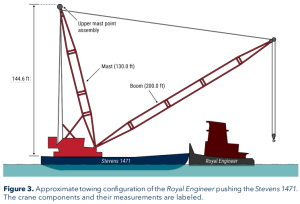NTSB has issued an investigation report on an incident involving the crane aboard the Royal Engineer tow making contact with a terminal cargo crane.
The incident
On January 4, 2024, about 1620 local time, the towing vessel Royal Engineer was transiting the Cooper River near North Charleston, South Carolina, while pushing the crane barge Stevens 1471 when the barge crane contacted a ship-to-shore crane at the North Charleston Terminal. There were no injuries, and no pollution was reported. Damage to the terminal’s crane was estimated to be over $4.5 million.
Analysis
While the towing vessel Royal Engineer was pushing the crane barge Stevens 1471 in the Cooper River, the tow transited underneath an STS crane at the North Charleston Terminal while maneuvering through a narrow area between a docked containership and a dredging vessel because the dredge’s floating discharge pipeline was blocking the rest of the channel. The barge crane contacted the STS crane, resulting in extensive damage to the STS crane.

The Royal Engineer mate was aware of the dredging operations along the tow’s transit route. The day before the contact, on January 3, he had transited the area between the dredge and the North Charleston Terminal, but there was no containership berthed at the terminal. The mate told investigators that, on the day of the contact, he attempted twice to contact the dredge crew early—first an hour and then 45 minutes before he reached the dredge—to make passing arrangements. However, the mate could not establish communications with the dredge crew until about 15 minutes before the Royal Engineer tow reached the dredging area.
The mate told investigators that his original intention was to request that the dredge “break the pipeline” so that the tow could pass to the east of the dredge. In this scenario, the tow would have proceeded down the middle of the channel, where there was plenty of open water. It was not unusual for the dredge to break down the discharge pipeline to allow vessel traffic to pass. However, the dredge captain informed the mate of his preference for the tow to pass to the west of the dredge, and they agreed the tow would proceed through the narrow area between the dredge and the containership Celsius Nicosia.
Roughly 15 minutes passed between the time that the Royal Engineer mate and Brunswick dredge captain made passing arrangements and the time of the contact. The mate did not realize the STS crane extended over the side of the Celsius Nicosia and impeded the tow’s route until about one minute before the contact. The mate’s focus on maneuvering the tow between two vessels in a confined area likely contributed to his delayed awareness of how far the STS crane extended over the water.

By the time the mate noticed the STS crane’s position, he was committed to proceeding through the narrow opening between two vessels, and the tow was traveling at 5 knots with a following current. The mate asked the deckhand if it looked like the top of the crane barge’s mast would pass beneath the STS crane boom, and the deckhand responded that he thought it would. However, from the deckhand’s position on the deck of the barge, about 144 feet lower than the highest point of the crane mast, his angle of view would have precluded him from making an accurate judgment.
Had the Royal Engineer mate been aware of the STS crane boom extending beyond the containership when he was determining passing arrangements, he likely would have realized the STS crane was a potential hazard and made a plan to avoid it.
Probable cause
The National Transportation Safety Board determines that the probable cause of the contact of the crane barge Stevens 1471 with a North Charleston Terminal ship-to-shore crane was the towing vessel mate not identifying that the ship-to-shore crane was an overhead hazard when he decided to maneuver the tow through a confined area between a dredge and a vessel conducting cargo operations.
Lessons Learned: Identifying that ship-to-shore cranes may be an overhead hazard
Ship-to-shore cranes, when conducting cargo operations on a vessel and in the lowered position, may extend considerably beyond the side of the vessel and become a hazard to vessels with high air drafts transiting nearby. Mariners should always consider their vessel and tow’s air draft when identifying hazards to navigation.






























































